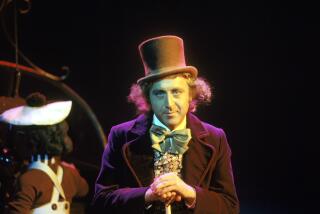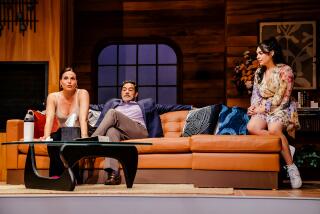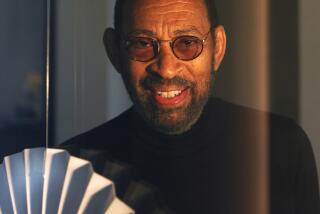Classic Hollywood: ‘Marx Brothers on Television’ shows wide range
When the Marx Brothers made their final film comedy, “Love Happy” in 1949, they found a new outlet for their outrageously funny shenanigans on the new medium of television.
Groucho scored a huge success bringing his popular radio game show “You Bet Your Life” to NBC in 1950, where it continued until 1961. And Harpo’s 1955 appearance on “I Love Lucy” re-creating his famous “Duck Soup” mirror routine with Lucille Ball has been seen in repeats for decades.
But “You Bet Your Life” and “I Love Lucy” was just the tip of the Marxist iceberg.
------------
FOR THE RECORD:
Marx Brothers: The Classic Hollywood article in the Aug. 10 Calendar section about a new Marx Brothers DVD box set said Groucho, Harpo, Chico and Gummo got their nicknames at the Orpheum theater in Galesburg, Ill. That likely happened at the Gaiety or Auditorium theaters but not at the Orpheum, which hadn’t been built at that time. The article also misspelled Galesburg as Galesberg. —
------------
Shout! Factory’s new three-disc DVD set, “The Marx Brothers on Television,” shows the wide range of shows the siblings appeared on in the 1950s, ‘60s and, in the case of Groucho, into the 1970s.
“We have game shows, sports shows, variety shows, talk shows and sitcoms,” said DVD producer Robert S. Bader, who also produced the DVD sets of “You Bet Your Life.”
There’s a great 1955 episode of “The Jack Benny Show” in which Benny tries to win money on “You Bet Your Life”; Harpo’s sweetly comedic final performance in the long-forgotten 1962 ABC sitcom “Mr. Smith Goes to Washington”; the only surviving episode of Chico’s 1950-51 ABC comedy series “The College Bowl”; Marx Brothers home movies, which feature the earliest known footage of Groucho and Harpo briefly in the nude; a “You Bet Your Life” stag reel that’s quite “blue”; and the only surviving episode of “Groucho,” a short-lived 1965 British version of “You Bet Your Life.”
Perhaps the most fascinating piece in the set is actually a drama — “A Silent Panic,” a 1960 episode of “The DuPont Show with June Allyson.” Harpo hung up his trademark curly red wig, hat and harp to play a deaf-mute working in a department store window who sees a murder committed.
“That performance is really special,” said Harpo’s oldest son, Bill Marx, who is executive producer of the DVD set and worked for his father, who in died in 1964, from age 12 in various capacities. “That was his first and only serious acting role.”
Groucho also went dramatic once as a father who opposes his teenager daughter’s marriage to her boyfriend (Dennis Hopper) in the 1962 “The General Electric Theater: The Hold Out.”
But his performance sort of falls flat. “Groucho is trying very hard not to be Groucho,” Bader said.
Bader has been working for the last decade gleaning rare material. “In many cases, the only existing copies of this material was in the collection of the Marx Brothers themselves.”
Harpo’s daughter Minnie had the only known copy of a 1952 episode of the musical variety show “The Colgate Comedy Hour,” in which Harpo and Chico re-create a classic scene involving Harpo’s jacket sleeve and some not-so-hidden knives, which they previously performed in vaudeville and the 1930 film “Animal Crackers.”
“That is an absolute rare find,” Bader said. “It was thought to be lost.”
“They never seemed to lose their timing,” said Bill Marx, 77. “Guess who loaded the knives for him? At least 300 knives came out [of his sleeve], and a coffee pot!”
Though occasionally Groucho wore his grease paint mustache and frock coat for his appearances such as on 1955’s “The Swift Show Wagon,” Bader said, “he totally reinvented himself as the guy on ‘You Bet Your Life.’”
“The Marx Brothers TV Collection” is part of the centennial celebration of the Marx Brothers receiving their nicknames.
It happened while Julius, Arthur, Leonard and Milton Marx were performing their vaudeville act at the Orpheum Theatre in Galesberg, Ill. “In vaudeville, while they were waiting [to go on stage] they would be playing poker,” Bill Marx said.
During one game, monologuist Art Fisher gave the siblings what would become their stage names — Groucho, Harpo, Chico and Gummo (he left the act when drafted in World War I), which were inspired by Gus Mager’s comic strip “Sherlocko the Monk.”
“It was so popular that a lot of actors put an ‘o’ on the end of their names,” said Bill Marx, who noted that “it’s so much better to talk about Harpo, Groucho and Chico than Arthur, Julius and Leonard. It sounds better!”
And, as history proved, also much funnier.
Twitter: @mymackie
More to Read
Only good movies
Get the Indie Focus newsletter, Mark Olsen's weekly guide to the world of cinema.
You may occasionally receive promotional content from the Los Angeles Times.







